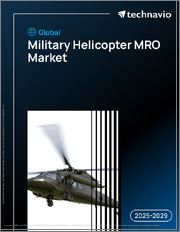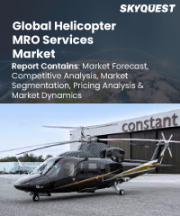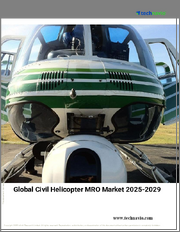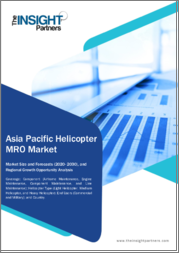
|
시장보고서
상품코드
1762837
헬리콥터 MRO 시장 평가 : 서비스 유형별, 헬리콥터 클래스별, 서비스 모델별, 지역별, 기회 및 예측(2018-2032년)Global Helicopter MRO Market Assessment, By Service Type, By Helicopter Class, By Service Model, By Region, Opportunities and Forecast, 2018-2032F |
||||||
세계 헬리콥터 MRO 시장은 2025-2032년 예측 기간 동안 5.12%의 CAGR을 기록하며 2024년 102억 8,000만 달러에서 2032년 153억 3,000만 달러로 성장할 것으로 예상됩니다. 헬리콥터 유지보수, 수리 및 정비 서비스 분야는 의료 대응팀, 법집행기관, 해상 작전, 도시 지역 항공 운송 서비스와 함께 헬리콥터 추가가 필요하기 때문에 지속적으로 성장하고 있습니다. 시장 확대를 촉진하는 주요 요인으로는 최신 기체 요구 사항과 규제 준수 기준, 신뢰할 수 있는 내공성 헬리콥터에 대한 요구 등을 들 수 있습니다.
디지털 시스템, 예지보전 접근법, 인공지능 도입 등 최신 기술 개발은 효율성 향상과 다운타임 감소를 통해 MRO 업무에 변화를 가져오고 있습니다. 정비 작업에는 많은 비용이 소요되고 숙련된 기술자가 부족하기 때문에 시장은 여전히 어려운 상황입니다. 시장의 추세는 혁신적인 사업 전략과 함께 환경 친화적인 운영 프로세스로 향하고 있습니다. 아시아태평양 시장은 헬리콥터 보유 대수 확대와 운항 수요 증가로 인해 강력하게 성장하고 있지만, 북미와 유럽은 여전히 중요한 시장입니다.
예를 들어, 2024년 7월 PHI MRO 서비스와 뉴욕 헬리콥터(New York Helicopter) 간의 계약에는 개조된 Bell 407 헬리콥터에 대한 특정 조항이 포함되어 있습니다. PHI의 MRO 사업의 성장은 헬리콥터 운영자에게 완벽한 운영 지원을 제공하는 동시에 맞춤형 항공기 솔루션을 제공함으로써 업계의 강점이 증가하고 있음을 보여줍니다.
목차
제1장 프로젝트 범위와 정의
제2장 조사 방법
제3장 미국 관세의 영향
제4장 주요 요약
제5장 고객의 소리
- 응답자 인구통계
- 브랜드 인지도
- 구입 결정시에 고려되는 요소
- 수명주기 비용 효율
제6장 세계의 헬리콥터 MRO 시장 전망, 2018-2032년
- 시장 규모 분석과 예측
- 금액별
- 시장 점유율 분석과 예측
- 서비스 유형별
- 엔진 유지보수
- 기체 및 아비오닉스 유지보수
- 부품 수리/점검
- 헬리콥터 클래스별
- 소형
- 중형
- 대형
- 서비스 모델별
- OEM 기반 MRO
- 독립계 MRO 프로바이더
- 항공사 사내 MRO
- 지역별
- 북미
- 유럽
- 아시아태평양
- 남미
- 중동 및 아프리카
- 기업별 시장 점유율 분석(상위 5개사 및 기타 - 금액별, 2024년)
- 서비스 유형별
- 2024년 시장 맵 분석
- 서비스 유형별
- 헬리콥터 클래스별
- 서비스 모델별
- 지역별
제7장 북미의 헬리콥터 MRO 시장 전망, 2018-2032년
- 시장 규모 분석과 예측
- 금액별
- 시장 점유율 분석과 예측
- 서비스 유형별
- 엔진 유지보수
- 기체 및 아비오닉스 유지보수
- 부품 수리/점검
- 헬리콥터 클래스별
- 소형
- 중형
- 대형
- 서비스 모델별
- OEM 기반 MRO
- 독립계 MRO 프로바이더
- 항공사 사내 MRO
- 국가별 점유율
- 미국
- 캐나다
- 멕시코
- 서비스 유형별
- 국가별 시장 평가
- 미국의 헬리콥터 MRO 시장 전망, 2018-2032년*
- 시장 규모 분석과 예측
- 시장 점유율 분석과 예측
- 캐나다
- 멕시코
- 미국의 헬리콥터 MRO 시장 전망, 2018-2032년*
모든 부문은 대상이 되는 모든 지역과 국가에 제공됩니다.
제8장 유럽의 헬리콥터 MRO 시장 전망, 2018-2032년
- 독일
- 프랑스
- 이탈리아
- 영국
- 러시아
- 네덜란드
- 스페인
- 튀르키예
- 폴란드
제9장 아시아태평양의 헬리콥터 MRO 시장 전망, 2018-2032년
- 인도
- 중국
- 일본
- 호주
- 베트남
- 한국
- 인도네시아
- 필리핀
제10장 남미의 헬리콥터 MRO 시장 전망, 2018-2032년
- 브라질
- 아르헨티나
제11장 중동 및 아프리카의 헬리콥터 MRO 시장 전망, 2018-2032년
- 사우디아라비아
- 아랍에미리트
- 남아프리카공화국
제12장 Porter's Five Forces 분석
제13장 PESTLE 분석
제14장 시장 역학
- 시장 성장 촉진요인
- 시장 과제
제15장 시장 동향과 발전
제16장 사례 연구
제17장 경쟁 구도
- 시장 리더 상위 5개사 경쟁 매트릭스
- 상위 5개사 SWOT 분석
- 시장 상위 10개사의 주요 기업 상황
- Airbus SE
- 기업 개요
- 주요 경영진
- 제공되는 주요 제품
- 주요 재무 상황(보고 시점)
- 주요 시장에 대한 주력과 지역적 입지
- 최근 동향/협업/파트너십/인수합병
- CHC Group LLC
- Honeywell International Inc.
- Leonardo SpA
- MTU Aero Engines AG
- Rolls-Royce Holdings Plc
- Safran SA
- Standard Aero LLC
- Textron Inc.
- PHI Group Inc.
상기 기업은 시장 점유율에 따른 순위를 보유하지 않으며, 조사 작업중 입수 가능한 정보에 따라 변경될 수 있습니다.
제18장 전략적 제안
제19장 조사 회사 소개 및 면책사항
ksm 25.07.11Global helicopter MRO market is projected to witness a CAGR of 5.12% during the forecast period 2025-2032, growing from USD 10.28 billion in 2024 to USD 15.33 billion in 2032. The helicopter maintenance, repair, and overhaul service sector continue to grow because medical response teams, law enforcement, and offshore operations, together with urban air transport services, require additional helicopters. The primary factors driving market expansion include modern fleet requirements and regulatory compliance standards, and the requirement for reliable airworthy helicopters.
Modern technological developments, including digital systems and predictive maintenance approaches, and artificial intelligence implementation, transform MRO operations through improved efficiency and reduced downtime. The market remains under pressure because maintenance operations cost a lot, and there are not enough skilled technicians available. The market trends toward environmentally friendly operational processes, together with innovative business strategies. The Asia-Pacific market grows strongly because of expanding helicopter fleets and increased operational demands, yet North America and Europe continue to hold significant market importance.
For instance, in July 2024, the contract between PHI MRO Services and New York Helicopter contains specific provisions for a modified Bell 407 helicopter. PHI's growing MRO business shows increasing industry strength because it delivers customized aircraft solutions while offering complete operational support to helicopter operators.
Increasing Helicopter Services Fuel the Helicopter MRO Market Demand
Helicopter usage across civil and military, and commercial sectors has caused major growth in MRO services for these helicopters. Helicopter fleets have grown larger and more diverse due to emergency medical response and search and rescue and law enforcement and tourism, and offshore operations, thus requiring extensive maintenance programs to maintain operational safety. The need for specialized MRO solutions grows due to fleet modernization initiatives, together with advanced technology integration and changing regulatory standards. The market competition intensifies among service providers who use advanced maintenance systems together with diagnostic methods because operators require both efficient operations and regulatory compliance.
For instance, in March 2025, the partnership between Skyryse, Inc. and United Rotorcraft, LLC enables them to install advanced avionics on Airbus and Black Hawk helicopters while United Rotorcraft delivers maintenance, repair, and overhaul (MRO) services to meet the rising demand in the growing helicopter services market.
Technological Advancement Pumps the Helicopter MRO Market Demand
Technological evolution drives major changes in the global helicopter MRO market through improved operational efficiency and enhanced safety and reduced environmental impact. The combination of digitalization with predictive maintenance and health monitoring systems enables operators to conduct maintenance before problems emerge, which reduces operational disruptions. The MRO sector experiences growing cooperation through Memoranda of Understanding (MoUs), which enable joint development of capabilities alongside technology transfer and local capability development. Through these partnerships, companies achieve more efficient workflow operations while building stronger supply chains and establishing regional maintenance networks. The market advances through technological innovations, which include robotic systems and augmented reality applications, together with environmentally friendly MRO procedures. The combination of these advancements meets the growing requirements of emergency and law enforcement, commercial users, and maintains industry standards and global aviation competitiveness.
For instance, in November 2024, the Dutch Ministry of Defense received enhanced technological maintenance and advanced helicopter market capabilities through the long-term skilled support and operational readiness of 12 H225M helicopters under MRO services provided by Fokker Services Group and Airbus Helicopters following their MoU agreement.
Engine Maintenance Dominates Helicopter MRO Market Share
The helicopter MRO market shows engine maintenance as its largest division because engines serve essential performance and safety functions while meeting regulatory standards. Engine maintenance requirements are increasing due to aging helicopter fleets and rising operational requirements, which demand advanced diagnostic and repair methods. The advanced materials and systems of modern engines demand cutting-edge facilities and expert personnel to maintain their air worthiness and reliability standards. The implementation of predictive maintenance tools, including real-time data analytics and artificial intelligence, transforms engine maintenance through forward-looking inspections that decrease unscheduled breakdowns. Engine health maintenance stands as the primary focus, which establishes its position as the top segment in helicopter MRO operations.
For instance, in February 2025, the five-year MRO contract between General Electric Company (GE Aerospace) and the Indian Air Force for Apache helicopter engines showed that engine maintenance stands as the leading segment in the helicopter MRO market. Mission success and operational readiness demand immediate engine availability and fast turnaround times.
Europe Dominates the Helicopter MRO Market Size
Europe holds a dominant position in the global helicopter maintenance, repair, and overhaul (MRO) industry due to its developed aerospace facilities and experienced personnel and established original equipment manufacturer (OEM) operations. Major MRO hubs exist throughout Europe because of the substantial presence of civil and military helicopter operators who need routine maintenance services. European regulatory standards and technological advancements support continued innovation and safety compliance, which establishes the region as an ideal location for complete MRO operations. Strategic partnerships between defense organizations and private companies help to boost operational capabilities while expanding available service options. Europe maintains its position as the top provider of helicopter MRO services as it delivers dependable results through experienced operations with superior quality standards.
For instance, in April 2025, Rotortrade Services Pte. Ltd. operated as a leading MRO provider in Europe after receiving EASA certification for its Tallard facility to maintain Leonardo AW139 helicopters. The new approval allows Rotortrade to extend its maintenance capabilities to support Airbus clients alongside Leonardo helicopter operators, which boosts Europe's position in helicopter maintenance operations.
Impact of U.S. Tariffs on Global Helicopter MRO Market
The implementation of U.S. tariffs results in higher prices for imported spare parts and components, which directly raise maintenance costs for helicopter operators. These increased costs create financial stress for independent MRO providers because they must work within restricted profit margins.
The cost of repairs might decrease when operators choose MRO facilities located in tariff-affected regions. The changing demand patterns between established MRO hubs and tariff-favorable locations will affect market distribution.
The rising cost of new components drives operators and MRO providers toward choosing component repair and overhaul as their primary approach. The industry shift toward repair technologies creates both innovative potential and growing market requirements for sophisticated repair solutions.
Tariffs cause procurement delays and create uncertainties, which disrupt operational planning and turnaround times. The industry remains cautious about investments while waiting for trade conditions to reach stability before pursuing growth plans.
Key Players Landscape and Outlook
The market is operated by major producers and key service companies, which establish operational standards and lead innovative practices. The organizations use predictive maintenance systems and artificial intelligence to enhance operational efficiency while lowering unplanned downtime. The market remains intensely competitive because companies enhance their service offerings and establish partnerships to boost their market standing. The industry structure depends heavily on regional factors because established markets maintain their position through strong infrastructure systems and high customer demand, while emerging regions accelerate their operations by modernizing fleets and investing in infrastructure. The entire sector focuses on technological progress, together with its ability to meet changing customer requirements.
For instance, in April 2025, Leonardo S.p.A. won a USD 213 million contract to extend its support of the UK Royal Navy's 54 Merlin helicopters for two more years. The helicopter MRO market maintains strong demand which ensures persistent operational support to maintain fleet readiness.
Table of Contents
1. Project Scope and Definitions
2. Research Methodology
3. Impact of U.S. Tariffs
4. Executive Summary
5. Voice of Customers
- 5.1. Respondent Demographics
- 5.2. Brand Awareness
- 5.3. Factors Considered in Purchase Decisions
- 5.4. Lifecycle Cost Efficiency
6. Global Helicopter MRO Market Outlook, 2018-2032F
- 6.1. Market Size Analysis & Forecast
- 6.1.1. By Value
- 6.2. Market Share Analysis & Forecast
- 6.2.1. By Service Type
- 6.2.1.1. Engine Maintenance
- 6.2.1.2. Airframe and Avionics Maintenance
- 6.2.1.3. Component Repair/Overhaul
- 6.2.2. By Helicopter Class
- 6.2.2.1. Light
- 6.2.2.2. Medium
- 6.2.2.3. Heavy
- 6.2.3. By Service Model
- 6.2.3.1. OEM-Based MRO
- 6.2.3.2. Independent MRO Providers
- 6.2.3.3. In-House Airline MRO
- 6.2.4. By Region
- 6.2.4.1. North America
- 6.2.4.2. Europe
- 6.2.4.3. Asia-Pacific
- 6.2.4.4. South America
- 6.2.4.5. Middle East and Africa
- 6.2.5. By Company Market Share Analysis (Top 5 Companies and Others - By Value, 2024)
- 6.2.1. By Service Type
- 6.3. Market Map Analysis, 2024
- 6.3.1. By Service Type
- 6.3.2. By Helicopter Class
- 6.3.3. By Service Model
- 6.3.4. By Region
7. North America Helicopter MRO Market Outlook, 2018-2032F
- 7.1. Market Size Analysis & Forecast
- 7.1.1. By Value
- 7.2. Market Share Analysis & Forecast
- 7.2.1. By Service Type
- 7.2.1.1. Engine Maintenance
- 7.2.1.2. Airframe and Avionics Maintenance
- 7.2.1.3. Component Repair/Overhaul
- 7.2.2. By Helicopter Class
- 7.2.2.1. Light
- 7.2.2.2. Medium
- 7.2.2.3. Heavy
- 7.2.3. By Service Model
- 7.2.3.1. OEM-Based MRO
- 7.2.3.2. Independent MRO Providers
- 7.2.3.3. In-House Airline MRO
- 7.2.4. By Country Share
- 7.2.4.1. United States
- 7.2.4.2. Canada
- 7.2.4.3. Mexico
- 7.2.1. By Service Type
- 7.3. Country Market Assessment
- 7.3.1. United States Helicopter MRO Market Outlook, 2018-2032F*
- 7.3.1.1. Market Size Analysis & Forecast
- 7.3.1.1.1. By Value
- 7.3.1.2. Market Share Analysis & Forecast
- 7.3.1.2.1. By Service Type
- 7.3.1.2.1.1. Engine Maintenance
- 7.3.1.2.1.2. Airframe and Avionics Maintenance
- 7.3.1.2.1.3. Component Repair/Overhaul
- 7.3.1.2.2. By Helicopter Class
- 7.3.1.2.2.1. Light
- 7.3.1.2.2.2. Medium
- 7.3.1.2.2.3. Heavy
- 7.3.1.2.3. By Service Model
- 7.3.1.2.3.1. OEM-Based MRO
- 7.3.1.2.3.2. Independent MRO Providers
- 7.3.1.2.3.3. In-House Airline MRO
- 7.3.1.2.1. By Service Type
- 7.3.1.1. Market Size Analysis & Forecast
- 7.3.2. Canada
- 7.3.3. Mexico
- 7.3.1. United States Helicopter MRO Market Outlook, 2018-2032F*
All segments will be provided for all regions and countries covered
8. Europe Helicopter MRO Market Outlook, 2018-2032F
- 8.1. Germany
- 8.2. France
- 8.3. Italy
- 8.4. United Kingdom
- 8.5. Russia
- 8.6. Netherlands
- 8.7. Spain
- 8.8. Turkey
- 8.9. Poland
9. Asia-Pacific Helicopter MRO Market Outlook, 2018-2032F
- 9.1. India
- 9.2. China
- 9.3. Japan
- 9.4. Australia
- 9.5. Vietnam
- 9.6. South Korea
- 9.7. Indonesia
- 9.8. Philippines
10. South America Helicopter MRO Market Outlook, 2018-2032F
- 10.1. Brazil
- 10.2. Argentina
11. Middle East and Africa Helicopter MRO Market Outlook, 2018-2032F
- 11.1. Saudi Arabia
- 11.2. UAE
- 11.3. South Africa
12. Porter's Five Forces Analysis
13. PESTLE Analysis
14. Market Dynamics
- 14.1. Market Drivers
- 14.2. Market Challenges
15. Market Trends and Developments
16. Case Studies
17. Competitive Landscape
- 17.1. Competition Matrix of Top 5 Market Leaders
- 17.2. SWOT Analysis for Top 5 Players
- 17.3. Key Players Landscape for Top 10 Market Players
- 17.3.1. Airbus SE
- 17.3.1.1. Company Details
- 17.3.1.2. Key Management Personnel
- 17.3.1.3. Key Products Offered
- 17.3.1.4. Key Financials (As Reported)
- 17.3.1.5. Key Market Focus and Geographical Presence
- 17.3.1.6. Recent Developments/Collaborations/Partnerships/Mergers and Acquisitions
- 17.3.2. CHC Group LLC
- 17.3.3. Honeywell International Inc.
- 17.3.4. Leonardo S.p.A.
- 17.3.5. MTU Aero Engines AG
- 17.3.6. Rolls-Royce Holdings Plc
- 17.3.7. Safran SA
- 17.3.8. Standard Aero LLC
- 17.3.9. Textron Inc.
- 17.3.10. PHI Group Inc.
- 17.3.1. Airbus SE
Companies mentioned above DO NOT hold any order as per market share and can be changed as per information available during research work.















